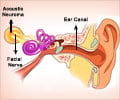Tiny, virus-sized particles called exosomes are released by cancer cells. They can bioengineer micro-RNA molecules resulting in tumor growth.

Exosomes are small vesicles consisting of DNA, RNA and proteins enclosed in a membranes made up of two lipid layers. They perform specialized functions such as coagulation, intercellular signaling and cell "waste management." They are shed into bodily fluids forming a source of disease-specific nucleic acids and proteins. Increasingly, exosomes are studied for their potential as both indicators of disease, and as a prospective new treatment approach.
All exosomes contain a cellular stew of smaller components including proteins, messenger RNA (mRNA) and miRNAs. Kalluri's team reported that breast cancer associated exosomes contain specific miRNAs associated with a multi-protein complex known as RNA-induced silencing complex (RISC).
In addition to RISC, the breast cancer exosomes also house Dicer and two other proteins, AGO2 and TRBP, all of which together provoke tumor growth.
"The role of miRNAs associated with exosomes in cancer progression is largely unknown. Many studies have suggested the presence of miRNAs in exosomes and speculated on their function," said Kalluri. "We demonstrated that inhibiting the action of Dicer in cancer exosomes significantly impairs tumor growth, raising the possibility that miRNAs in exosomes contributes to cancer progression."
Kalluri's study indicated that the interplay between Dicer and its "host" exosome may allow cancer cells to develop an "oncogenic field effect" by manipulating surrounding cells via exosomes. Think of a child blowing a dying dandelion's spores into the wind where they float over a newly mowed lawn and one can envision how this molecular mixer easily spreads the disease to surrounding tissue.
Advertisement
Source-Eurekalert














